Looking between the lines: Marginalia in the DEI Collections
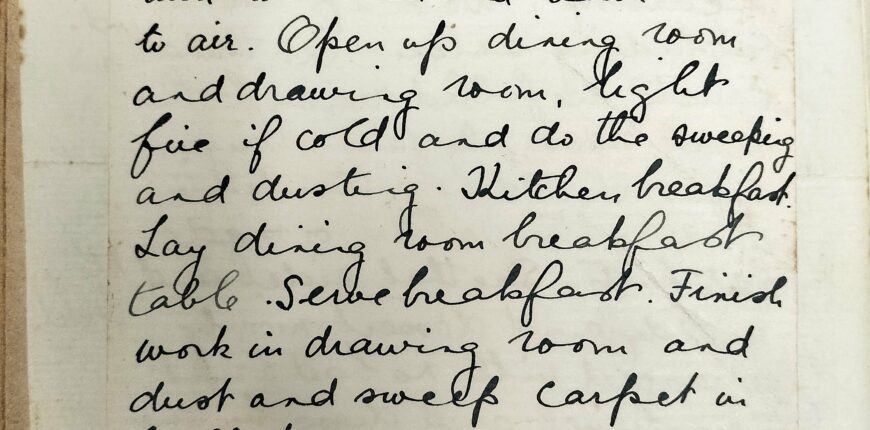
A book is an item that may be reshaped, added to, or amended by the person who holds it. Many of our collection items at the DEI are the products of a long history of owners, who have added extra notes, pasted in newspaper cuttings, or inserted pressed flowers into the volumes that were once their own. This exhibition focuses on the notes, letters, doodles, or “marginalia” that appear in some of our historic volumes, providing an intimate glimpse into a collection with an entangled history of owners and donors. In an age in which we are endeavouring to recover “hidden histories” in museums and library collections, this display offers a chance to consider these texts from a different perspective.
Item 1:
Stafford, Hugh, Esq. [with addendums by the Reverend George Turner and E. Gardiner ]
A Treatise on Cyder-Making, (1755)
This volume exists as a work of three parts: the printed and illustrated treatise of Hugh Stafford Esq, of Pynes in Devonshire, (1674-1734), the handwritten “directions” of the Reverend George Turner, (dates unknown), “for the improvement of Cider,” and the work of an E. Gardiner, (dates unknown), entitled “a main and concise treatise on the properties of apples and pears.” Turner in particular makes sure to advocate for the “virtues” of cider, as opposed to “pernicious” “French spirits.”
Library no. S. W. Cupboard 1755 STA
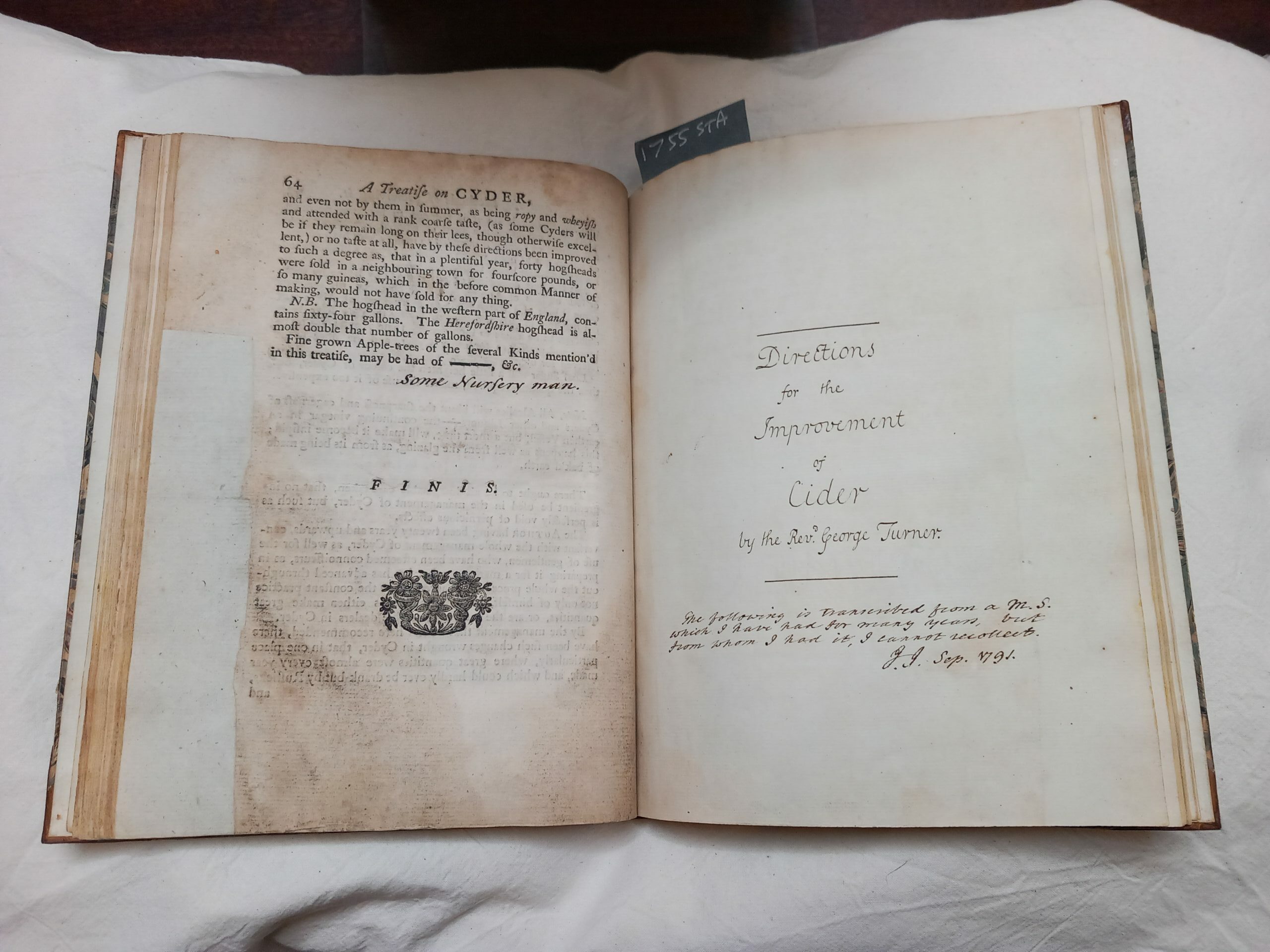
Item 2:
Samouelle, George [pages cut by an unknown hand]
A Nomenclature of British Entomology, (1819)
Despite its unassuming exterior, this volume has an interesting material history. As detailed in its opening advertisement, the book was intended to address “the great inconvenience which Entomologists lie under for the want of labels for their cabinets.” It seems the owner followed the author’s advice, cutting out words from the list of British insects with “a sharp pointed pen-knife,” to describe, presumably, their own collection of specimens. There is no record of how this volume came to be at the Devon & Exeter Institution, but as the building once hosted its own museum it is not too far-fetched to speculate that the removed text may have been used to describe a collection in-house.
Library no. N.10. 1819
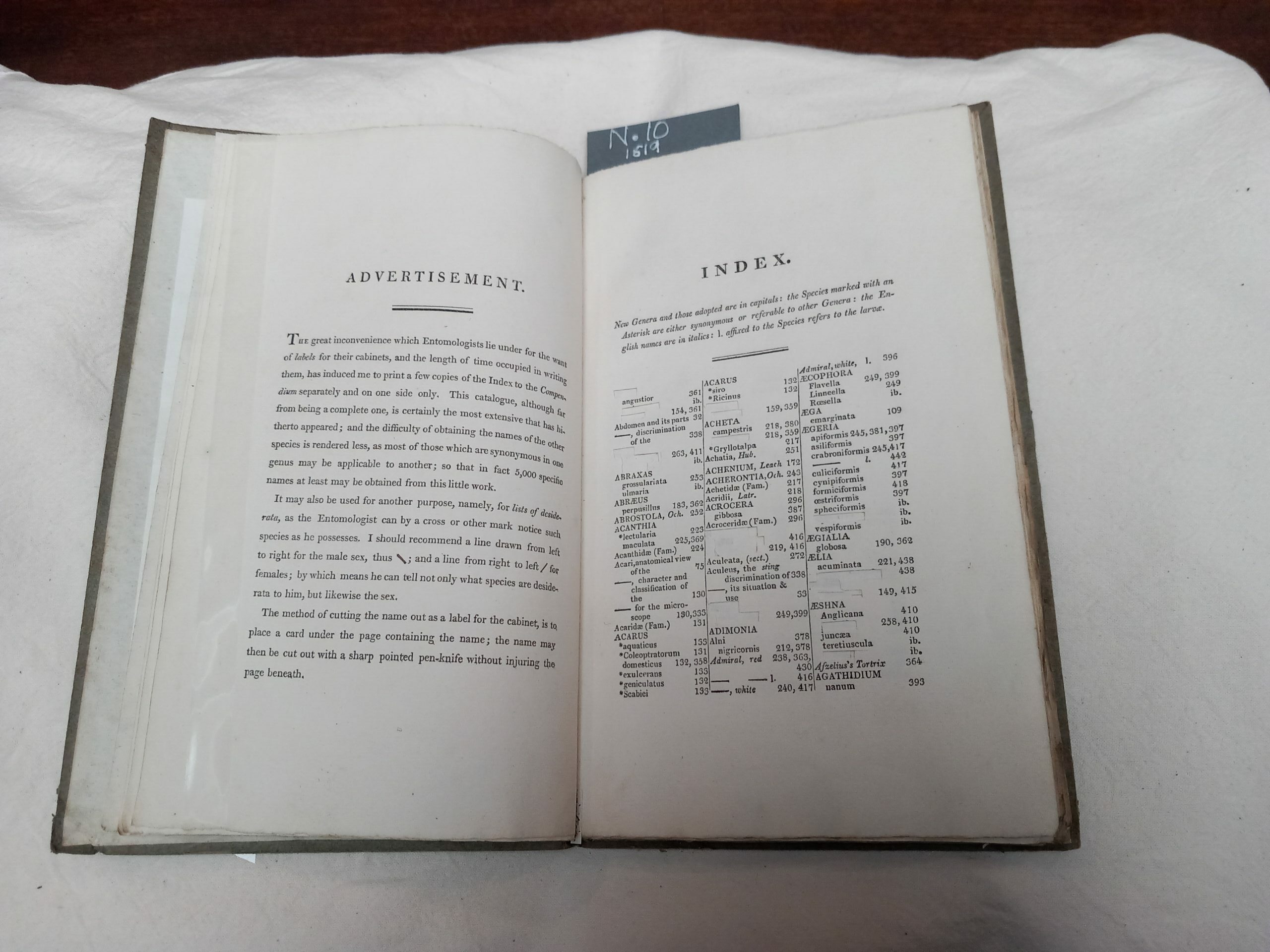
Item 3:
Hooker, William Jackson [with notes and specimen fragments by Amelia Griffiths]
The English Flora of Sir James Edward Smith, (1833)
Our current Collections Review has established that much of our Natural History section was once owned by the phycologist and seaweed-collector Mrs Amelia Warren Griffiths, (1768-1858), and donated to the Institution by her daughter Miss Amelia Elizabeth Griffiths, (1802-1861), in 1861. This is also the case with this volume, but it is perhaps particularly interesting as it contains notes and fragments of what appear to be formerly pasted-in specimens. Her influence and knowledge are attested to by the author’s dedication “To Mrs Griffiths,” “with sentiments of unfeigned regard and esteem.” Griffiths died in Torquay in 1858.
Library no. N. 19. 4
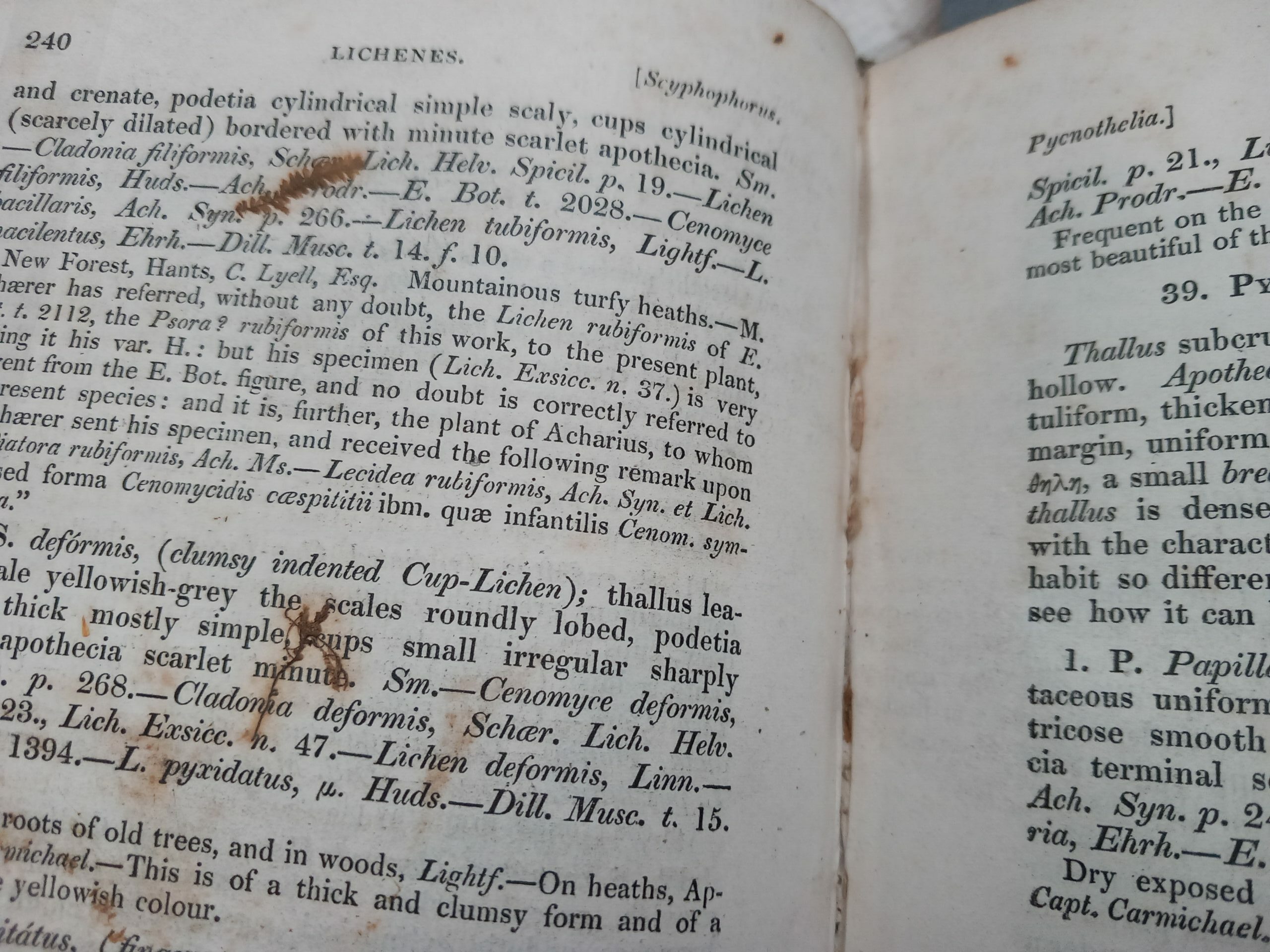
Item 4:
Ravenshaw, Thomas F. [with flowers collected and pressed by an unknown hand]
A New List of the Flowering Plants and Ferns Growing Wild in the County of Devon, (1860)
Pteridomania, or “Fern Fever” took hold across mid-Victorian Britain, but the term was coined in the South West, by the author Charles Kingsley, brother of avid fern fan and novelist Charlotte Chanter. Thomas Ravenshaw was the curate to Charlotte’s husband, John Mills Chanter, at Holy Trinity Church, Ilfracombe, where he appeared to gather inspiration for his own volume on flowers and ferns. At some point in this book’s history, a previous owner was inspired to collect and press flower specimens between its pages, where they remained until they were discovered by a researcher in the Devon & Exeter Institution library in 2022.
Library no. S. W. Heritage 1860 RAV
Item 5:
Cossins, James [with pasted newspaper cuttings and notes by W. G. Hoskins]
Reminiscences of Exeter, Fifty Years Since, (1878)
This small volume is interspersed with newspaper cuttings and notes by W. G. Hoskins (1908- 1992), an Exeter-born local historian who devised the cataloguing system for South-West collections at the Devon & Exeter Institution. The final page includes some personal reflections about the scribe’s great grandfather, grandfather and father, who were breadmakers in Exeter. The account concludes: “My father baked bread for the last time on September 8, 1945, and the business closed down after 111 years.” The item was donated by Hoskins in 1986.
Library no. S. W Cupboard 1878 COS
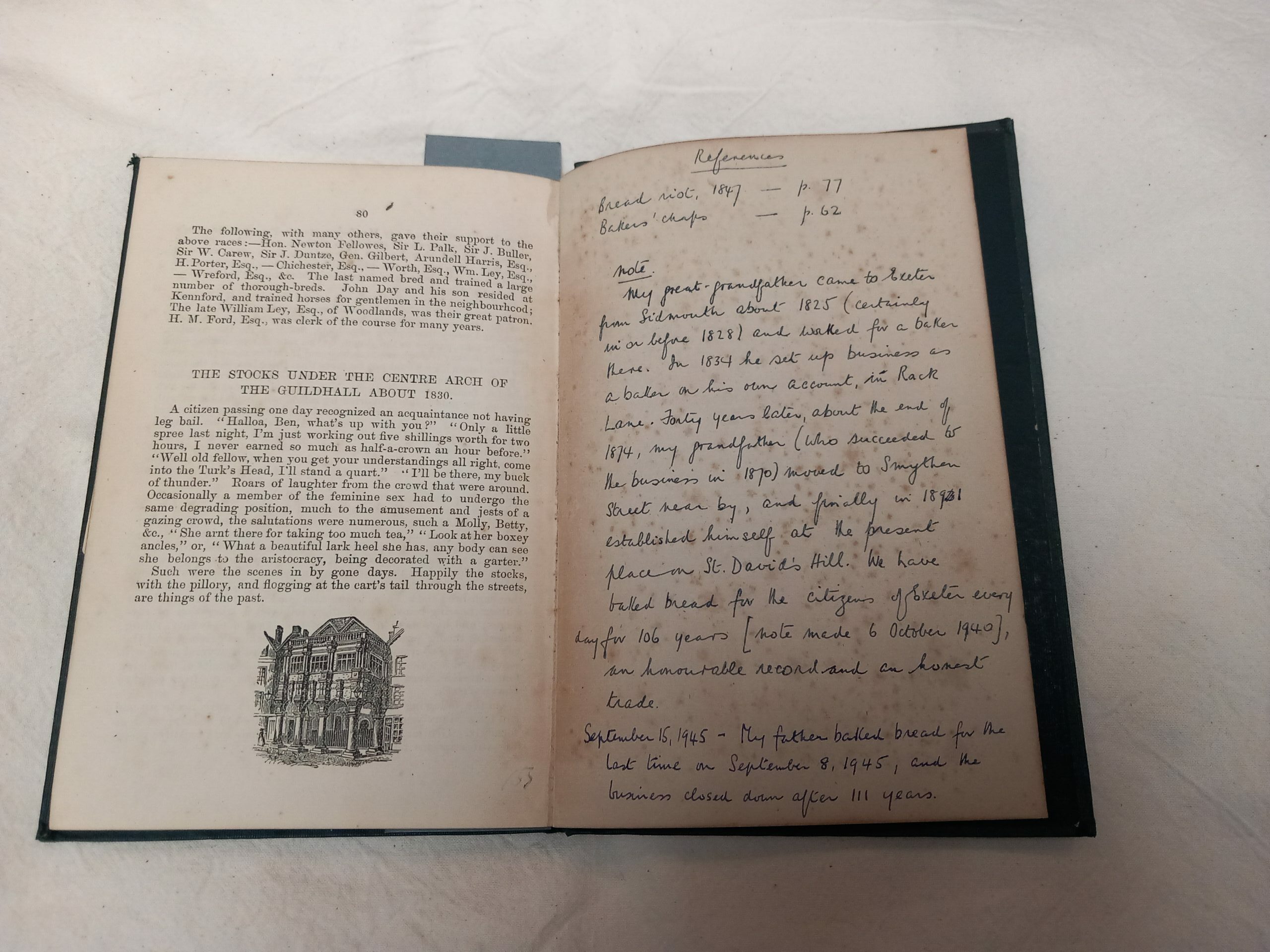
Item 6:
Jack, Florence B. [with letters by Dorothy Langford Brown]
The Woman’s Book: contains everything a Woman ought to know, (1911)
A colourful cloth-bound guide to household management, this book was bought shortly after its publication, and originally gifted to Dorothy Langford Brown, (c.1883-1940s), by her father in Christmas 1911. The volume contains loose sheets by Langford Brown detailing the “duties” of a parlour maid and a housemaid, some of which were written on headed notepaper from “Barton Hall, Kingskerswell, Devon” (later bought by holiday park company Pontins). The book and its contents were donated to the Devon & Exeter Institution in 1991 by Langford Brown’s adoptive daughter, Theo Brown, (1914-1993), a prominent folklorist and former Research Fellow at the University of Exeter.
Library no. Bay 69 1911 JAC.

